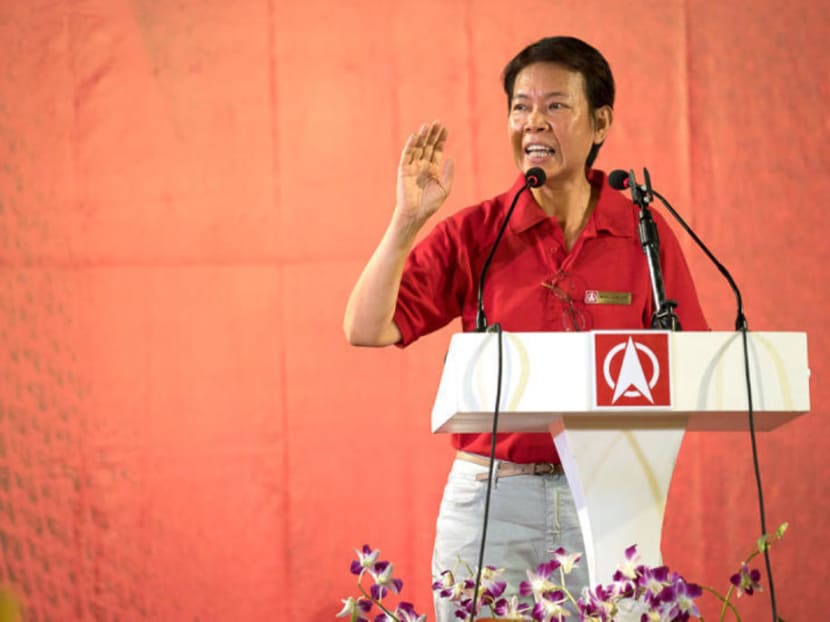SDP calls on apex court to issue mandatory order for Marsiling-Yew Tee MPs to step down
SINGAPORE — In a final bid to secure a by-election for the Marsiling-Yew Tee Group Representation Constituency (GRC), Singapore Democratic Party (SDP) member Wong Souk Yee called on the apex court to issue a mandatory order to compel its three Members of Parliament (MPs) to step down.

It is the constitutional duty of the Members of Parliament to call for an election, lawyer Peter Low said, in a lawsuit that is fronted by Singapore Democratic Party’s assistant treasurer, Dr Wong Souk Yee (pictured).
SINGAPORE — In a final bid to secure a by-election for the Marsiling-Yew Tee Group Representation Constituency (GRC), Singapore Democratic Party (SDP) member Wong Souk Yee called on the apex court to issue a mandatory order to compel its three Members of Parliament (MPs) to step down.
Madam Halimah Yacob had vacated her seat in the four-member GRC in August 2017 to run for president.
On Wednesday (Jan 16), the five-judge apex court reserved judgment after a two-hour hearing.
Dr Wong contends that there are contradictions between Article 49(1) of the Constitution that requires a vacated seat to be filled and Article 24(2A) of the Parliamentary Elections Act, which mandates a by-election to be called only if all seats of a GRC were vacated.
Her lawyer, Mr Peter Low, asserted in court that the remaining three MPs — National Development Minister Lawrence Wong, Mr Alex Yam and Mr Ong Teng Koon — need to comply with both statutes.
“It is the MPs’ constitutional duty to call for an election. They took an oath of office saying that they would protect, preserve, defend and uphold the Constitution,” Mr Low said.
In essence, his argument is that since Article 49(1) requires a vacated seat to be filled, the remaining three MPs must resign so that the seat can be filled through a by-election.
However, Chief Justice Sundaresh Menon disagreed with the interpretation, saying that issuing the mandatory order would be “extraordinary”.
Pointing out that Article 49 was enacted at a time when GRCs did not exist, he said: “(The law has to be applied in its) current context. You can’t divorce that from what the Parliament’s intentions were (after 1988, the year the GRC scheme was introduced).”
Judge of Appeal Andrew Phang said that Mr Low was “trying to shoehorn (his) view despite what the context tells us”.
“The context you are trying to persuade (the court) to adopt is completely contrary — 180 degrees, even — to what was stated in Parliament,” he said.
Judge of Appeal Judith Prakash asserted that Mr Low’s interpretation is “even more inconsistent” with the law, as it made no mention about forcing any MP to resign should a seat be vacated.
At the hearing, the public gallery was packed with members of the public, law academics and lawyers.
In September 2017, Dr Wong, who is assistant treasurer of SDP, filed the lawsuit on behalf of the opposition party on the same day Madam Halimah won unopposed in Singapore’s inaugural reserved presidential election.
Last April, the High Court dismissed her bid to call for a by-election on grounds that there is no basis in law to compel the remaining MPs to resign. The Constitution requires a by-election to be called for a whole GRC team only when all seats in the GRC become vacant mid-term, the court said.
On Wednesday, Mr Low argued that a GRC with one missing MP shortchanges voters.
Since each MP is allowed to pose only up to five questions in any given parliamentary session, the right to representation is “compromised” when there is a vacancy and fewer parliamentary questions can be asked, he said.
This, however, seems to cut no ice with the judges.
Judge of Appeal Steven Chong said: “What you are saying is that (constituents) will be under-represented, but not unrepresented.”
Agreeing, Justice Phang said that the spirit and intention behind Article 49(1) is representation. A vacated seat in a single-member constituency will require a by-election as the constituency “can’t be left unrepresented”, he said.
In a GRC, constituents will still be represented even when one MP resigns, he noted, adding that Mr Low is sliding into a discussion about “extra-legal” matters rather than “strict legal points”.








